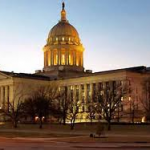As the legislative session came to an end, State Chamber President Fred Morgan said lawmakers and state leaders were able to keep the focus on improving the state’s business climate by passing policies that will help attract and retain jobs and investment to Oklahoma.
“Before session started, we noted how important it was for our state leaders and lawmakers to keep the legislative session focused on jobs and our state’s economy. As session concludes, it is clear they were successful in that mission,” said Morgan. “Gov. Mary Fallin and legislative leaders have made tremendous strides over the last year in economic development and improving our state’s business climate, and policies passed this session will help continue these efforts.”
The state’s tax system was much-debated this session, with the end result keeping taxes low in our state in order to spur economic growth in Oklahoma. One of the most important issues to the business community this session was the passage of Senate Joint Resolution 52, which proposes a constitutional amendment for a permanent prohibition on taxation of intangible personal property. The resolution will send a ballot question to a vote of the people this November. Intangible property can include items like trademarks, copyrights, membership or client lists, and other items difficult to quantify and assess.
If approved by the voters, SJR 52 will protect Oklahoma from a competitive disadvantage.
“This is a complicated subject and I would like to thank our state lawmakers for taking the time to study the issue and come up with a solution that prevents the largest tax increase on Oklahoma businesses in state history,” said Morgan. “This legislation will help keep capital and investment in our Oklahoma businesses, allowing them to grow and create more jobs. It is now critical that we work to educate all Oklahomans on the importance of this change to ensure it is approved by the voters in November.”
Lawmakers and state leaders also considered multiple plans to reduce the state’s personal income tax and conducted a thorough review of the state’s tax incentives offered to businesses that create jobs and investments in Oklahoma. The State Chamber’s policy has been to support the gradual reduction of the state’s personal income tax in a responsible way that does not shift the cost burden to Oklahoma’s job creators. The State Chamber has also supported the review of state income tax credits and incentives to ensure they are serving their intended purpose of job and investment creation, expansion and retention in our state. A tax cut was not passed this year, and while some tax credits were eliminated, the most important incentives for economic development and growth—including oil and gas credits, investment new jobs, wind, historical preservation and aerospace, among others—remained in place.
“We know lawmakers will continue to review these credits to ensure there is a strong return on investment for the Oklahoma taxpayers, and we are supportive of that ongoing process,” said Morgan.
“We believe the economic job and investment growth created by these incentives speaks for itself and we will continue to tell the business success stories on behalf of our membership.” Additional legislative victories this session include:
· Funding for the Governor’s Quick Action Closing Fund, which will enable the state to respond quickly to economic opportunities and compete effectively
· Funding for the state’s Endowed Chairs program, which will help attract world-class professors to our higher education system and help students become prepared to work in the 21st Century economy
· Closure of a loophole found in drug and alcohol testing legislation passed last year to ensure workers who are fired as a result of a positive drug test are not able to collect unemployment compensation upon dismissal
· Defeat of legislation to create regional water councils in Oklahoma, which would have added another layer of government bureaucracy and cost to Oklahoma’s water laws
· Passage of HJR 1085 to send to a vote of the people a funding mechanism for water infrastructure projects, to begin to address over $80 billion in needs over next 50 years
· Kept the 8-year Department of Transportation plan intact and helped increase funding to allow all 293 structurally-deficient highway bridges to be added to the plan
· Protection of recent education reforms that improve standards and accountability to help ensure Oklahoma has a skilled workforce
· Passage of the Energy Litigation Reform Act, or commonly known as fiduciary duty, to reduce frivolous lawsuits against the state’s oil and gas industry
The State Chamber also worked with business leaders across Oklahoma to further reform the state’s workers’ compensation system, which is consistently mentioned as one of the largest impediments to business growth in the state.
“While legislation giving Oklahoma employers an alternative to the state-run, adversarial system in place now failed to make it through the legislative process this year, we intend to work with lawmakers and state leaders throughout the interim to determine additional changes that need to be made to the system to bring down costs, all while protecting the injured workers,” said Morgan.
The State Chamber will also continue to monitor the U.S. Supreme Court this summer in anticipation of a ruling on the constitutionality of the federal health care law. Business leaders remain concerned about this far-reaching piece of legislation and the uncertain affect it will have on insurance rates if it withstands a court challenge.
“Gov. Mary Fallin and our state’s legislative leaders continued their efforts this session to grow Oklahoma’s economy and create more jobs and wealth in our state,” said State Chamber Chairman Bill Burgess. “The business community can be proud of the state and legislative leadership at the Capitol, who understand the importance of encouraging economic development in our state and passing policies that will help move Oklahoma forward.”



